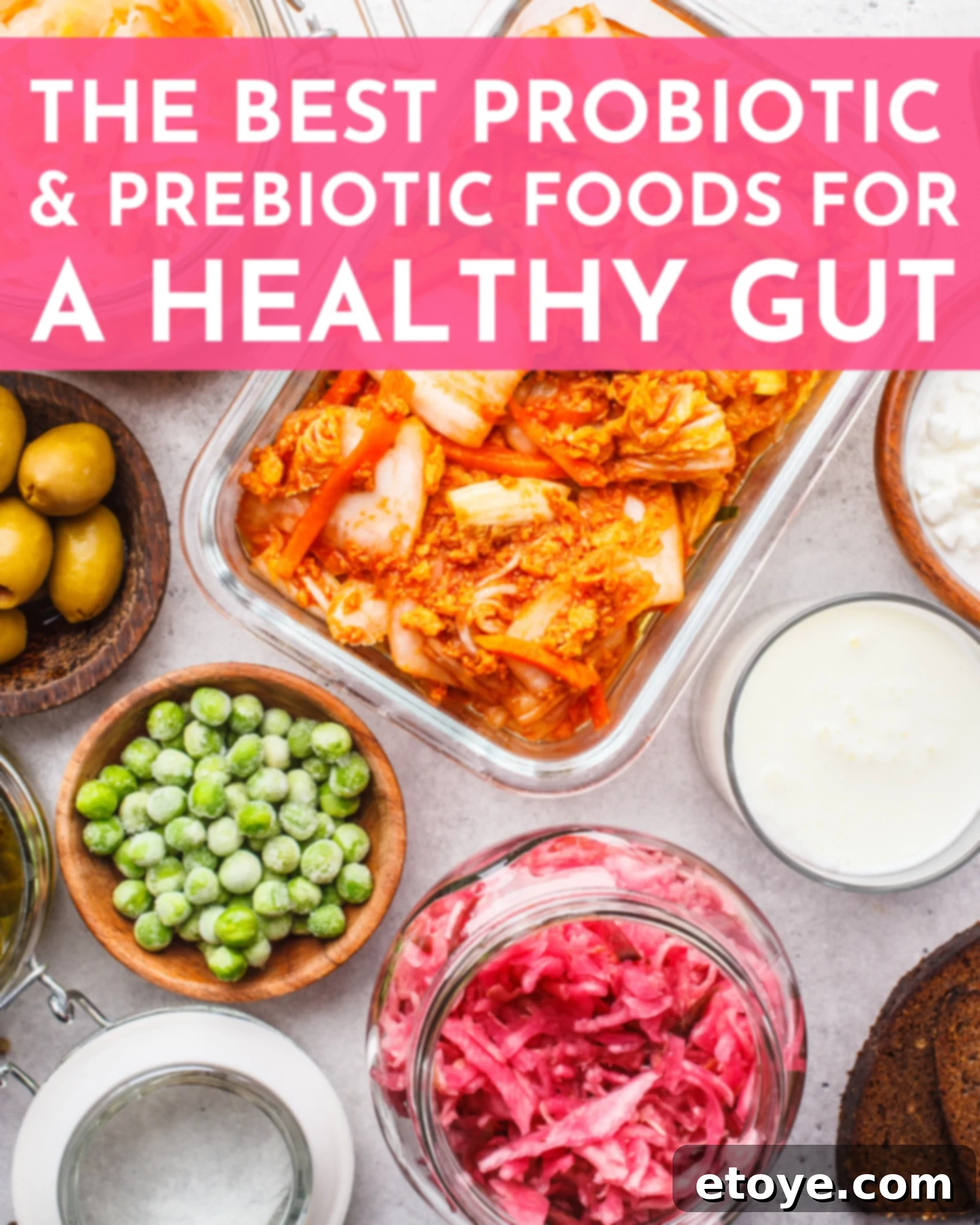Unlocking Your Inner Ecosystem: The Essential Guide to Probiotics and Prebiotics for Optimal Gut Health
Delve into the fascinating world beneath your belt – not the kind that calls for spontaneous skydiving, but the intricate, bustling ecosystem within your digestive system. Your gastrointestinal tract is a vibrant metropolis teeming with trillions of microorganisms, collectively known as your gut microbiome. These tiny residents are tirelessly working overtime to keep you healthy, happy, and, let’s be honest, regular. Understanding how to nurture this inner community is key to unlocking a healthier you.
You’ve likely encountered the buzzwords: probiotic foods, prebiotic ingredients, and gut microbiota. But what do these terms truly signify? And why has fermented cabbage suddenly become a wellness superstar? Buckle up, because we’re embarking on an illuminating journey to explore the science behind these vital compounds and how they contribute to a thriving digestive system.

What Are Probiotics? Your Gut’s Beneficial Bacteria
Probiotics are live microorganisms, often referred to as “good bacteria” or “beneficial yeasts,” that confer a health benefit to the host when administered in adequate amounts. These microscopic allies take up residence in your gut, playing a crucial role in maintaining your body’s delicate balance and keeping harmful pathogens at bay. When you consume probiotic-rich products like yogurt containing active cultures or sip on tangy kombucha, you’re essentially replenishing and bolstering the ranks of these good bacteria within your digestive tract.
The significance of probiotics extends far beyond mere digestion. They are instrumental in facilitating optimal nutrient absorption, ensuring your body gets the most out of the food you eat. Moreover, probiotics are powerful immune system boosters, helping to fortify your body’s defenses against illness. Emerging research also shows promising results in their ability to manage chronic conditions such as irritable bowel syndrome (IBS), inflammatory bowel disease (IBD), and ulcerative colitis, offering a natural pathway to relief for many. These diligent inhabitants of your large intestine perform an impressive array of functions, making them indispensable for overall well-being.
Different strains of probiotics offer unique benefits. For instance, Lactobacillus strains, commonly found in yogurt and fermented foods, are known for producing lactic acid, which helps inhibit the growth of harmful bacteria. Bifidobacterium strains, often present in dairy products, contribute to a healthy gut lining and can help reduce inflammation. A diverse range of these helpful microorganisms is vital for a robust and resilient gut ecosystem.
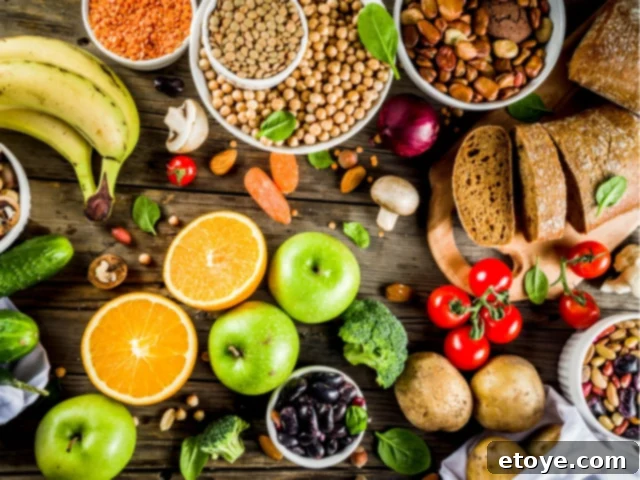
What Are Prebiotics? Fueling Your Gut Flora
If probiotics are the vital residents of your gut’s microbial city, then prebiotics are their essential groceries – the specialized food sources that nourish and stimulate the growth of beneficial bacteria. These are primarily non-digestible dietary fibers that pass through the upper part of the gastrointestinal tract undigested and reach the large intestine, where they are fermented by your gut’s microorganisms. That high-fiber advice your mom always gave you? Turns out, she was absolutely right (as moms often are!). Foods rich in prebiotics, such as garlic, onions, bananas, and Jerusalem artichokes, provide resistant starch and other types of fiber that your beneficial bacteria absolutely love to munch on.
The health benefits of prebiotics ripple far beyond the gut itself. By effectively supporting a thriving gut microbiome, prebiotics play a significant role in reducing systemic inflammation throughout the body, which is implicated in numerous chronic diseases. They are also increasingly linked to improved mental health, as a healthy gut can positively influence the gut-brain axis, impacting mood and cognitive function. Furthermore, prebiotics can aid in weight management by promoting satiety and influencing metabolic processes. A particularly noteworthy connection exists between prebiotics and the production of butyric acid, a short-chain fatty acid that serves as a primary energy source for your intestinal cells, effectively giving your intestinal lining a rejuvenating spa day. This remarkable interaction underscores the profound impact prebiotics have on maintaining gut integrity and overall health.
Common types of prebiotic fibers include inulin, fructooligosaccharides (FOS), galactooligosaccharides (GOS), and resistant starch. Each type can be found in different foods and supports slightly different groups of beneficial bacteria, highlighting the importance of a varied diet for comprehensive gut health.
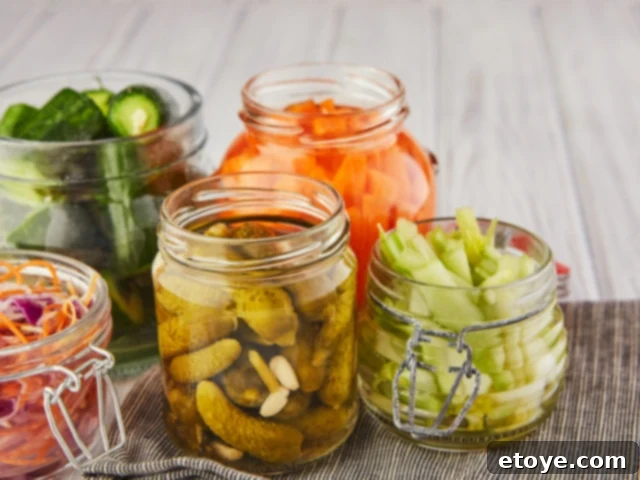
The Power of Fermented Foods: A Gut-Friendly Revolution
It’s hard to navigate a grocery store or a trendy restaurant these days without encountering a plate of fermented goodies. And for excellent reason! Fermented foods are a powerhouse combination, often serving as exceptional sources of both prebiotics and probiotics. The ancient process of fermentation, where microorganisms convert carbohydrates into alcohol or organic acids, not only preserves food but also enhances its nutritional value and creates an abundance of beneficial bacteria.
Staples like sauerkraut, kimchi, miso, tempeh, and even traditional sourdough bread are all fantastic food sources for cultivating a healthier gut microbiome. Beyond their impressive health benefits, these foods also inject a vibrant zing and complex flavors into your meals, making a healthy diet genuinely exciting and sustainable. Incorporating fermented foods is a delicious and effective strategy to diversify your gut flora and reap the rewards of a balanced inner ecosystem.
The Science Behind Gut Health: More Than Just a Feeling
Behind the burgeoning popularity of gut health lies a robust and ever-growing body of scientific evidence. Numerous randomized controlled trials and comprehensive clinical studies continually suggest that a healthy and diverse gut microbiome is not just beneficial for your digestive system—it’s intimately tied to a vast array of physiological processes and overall well-being. This intricate connection impacts your immune response, acting as a frontline defense against pathogens, plays a significant role in the prevention of chronic diseases like heart disease, influences the clarity and condition of your skin, and profoundly affects your mental health through the celebrated gut-brain axis.
For instance, one systematic review of multiple trials found compelling evidence that probiotics might offer therapeutic benefits for various conditions, including inflammatory bowel disease (IBD) and disorders affecting the small intestine. This highlights the potential for targeted dietary interventions to improve specific health challenges.
However—and this is a crucial caveat—researchers and authors consistently caution that the science of the microbiome is still rapidly evolving. While many studies unequivocally point to the profound benefits of prebiotics and probiotics, some findings may still be based on limited evidence, or primarily derived from animal studies, which do not always directly translate to human health. Therefore, it is imperative not to engage in self-diagnosis or attempt to treat serious health conditions solely with dietary changes. If you are experiencing a health problem or have concerns about your digestive system, always consult a qualified healthcare provider for personalized medical advice and appropriate treatment plans. A balanced approach, combining evidence-based dietary strategies with professional medical guidance, is always recommended.
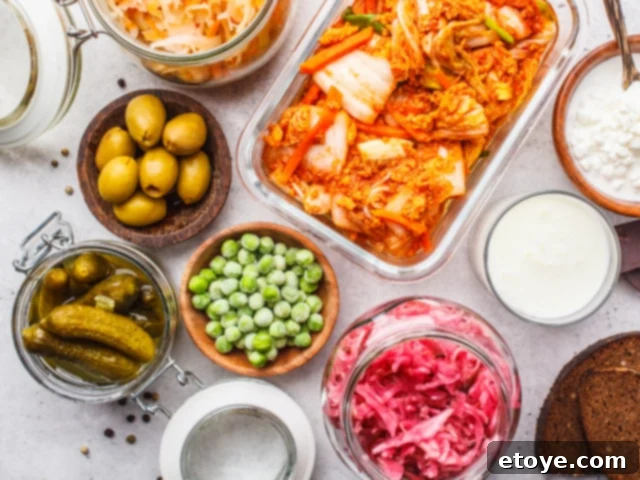
Probiotic Foods – Your Microbial Besties
Enriching your diet with diverse probiotic foods is an excellent way to support your gut health. Here are some of my favorite probiotic-packed options:
Yogurt with Active Cultures
A classic for a reason, yogurt is a creamy and delicious way to introduce beneficial bacteria like Lactobacillus and Bifidobacterium into your digestive system. Regular consumption may help alleviate symptoms of irritable bowel syndrome, enhance immune function, and even improve mental well-being thanks to the powerful gut-brain connection. Always check the label for “live and active cultures” to ensure you’re getting the truly beneficial strains, rather than just a sugar-laden dessert.
Kefir
Imagine kefir as yogurt’s tangier, more liquid cousin. This fermented dairy product is a powerhouse of diverse strains of helpful bacteria and live yeasts, offering an even broader spectrum of microbial benefits than many yogurts. It profoundly promotes a healthy gut microbiome and is incredibly versatile, easily incorporated into smoothies or enjoyed as a refreshing drink on its own. Bonus: Kefir also contains unique yeasts that can effectively outcompete harmful pathogens, further contributing to a happy and balanced gastrointestinal tract.
Kimchi
Spicy, tangy, and bursting with probiotics, kimchi is a vibrant Korean staple that delivers both robust flavor and impressive health benefits. The intricate fermentation process creates a formidable army of beneficial bacteria that actively support digestive health. Beyond probiotics, kimchi is rich in antioxidants, which help combat inflammation and protect your cells from damage. Plus, its distinctive flavor adds an exciting zing to rice bowls, stews, and wraps, making healthy eating a delight.
Miso
This savory fermented soybean paste is much more than just the base for miso soup; it’s a genuine probiotic goldmine. Miso contains active cultures that significantly improve your gut’s ecosystem and may even contribute to lowering your risk of heart disease due to its impact on cholesterol levels and blood pressure. It’s also an excellent source of B vitamins, making it a nutritious and flavorful addition to sauces, dressings, marinades, and even vegetable glazes.
Tempeh
For plant-based eaters and beyond, tempeh offers a protein-packed and gut-friendly option. Made from fermented soybeans, it naturally contains probiotics that enhance digestive function. Tempeh is also an exceptional source of resistant starch, a type of fiber that works synergistically with good bacteria to further improve gut health and help stabilize blood sugar levels. Grill it, bake it, or crumble it into stir-fries for a versatile and highly beneficial protein boost.
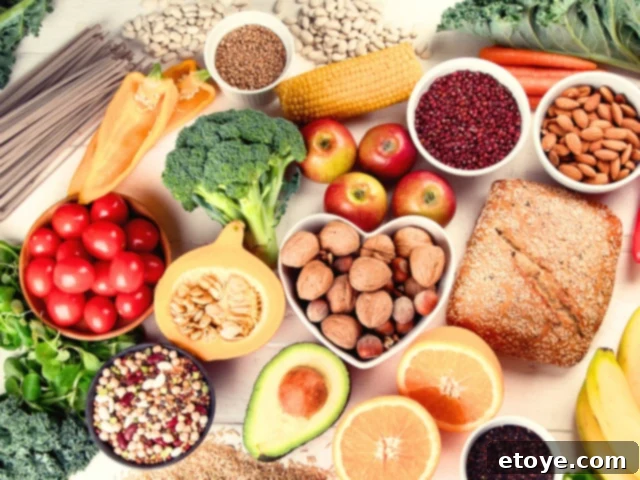
Prebiotic Foods – Essential Fuel for Your Gut Flora
To truly foster a thriving gut microbiome, you need to feed your beneficial bacteria with prebiotics. Here are some top prebiotic foods to incorporate into your diet:
Garlic
Far more than just a flavor enhancer, garlic is an exceptional prebiotic powerhouse. Packed with prebiotic compounds like inulin and fructooligosaccharides (FOS), garlic actively promotes the growth and activity of beneficial bacteria in your gut. It’s also strongly linked to an improved immune response and may even help reduce the risk of certain chronic diseases. Toss it generously into your cooking to give both your gut and your taste buds a significant boost.
Onions
Whether you enjoy them caramelized, raw, or sautéed, onions are a versatile and incredibly beneficial prebiotic ingredient that supports your gut’s microorganisms. Rich in various types of dietary fibers, including inulin and FOS, they provide essential nourishment for your gut bacteria. Onions are also known for their natural anti-inflammatory properties and are an excellent, accessible way to amplify the prebiotic effect of almost any meal.
Bananas
Bananas are the ultimate grab-and-go snack, but did you know they’re also a stellar prebiotic? Green, unripe bananas, in particular, are an excellent source of resistant starch, which effectively promotes the growth of helpful bacteria in your large intestine. As they ripen, the resistant starch converts to simple sugars, so for maximum prebiotic benefit, opt for greener varieties. They are also gentle on the stomach, making them perfect for individuals with a sensitive digestive tract.
Jerusalem Artichokes (Sunchokes)
Often called “sunchokes,” these knobby little root vegetables are absolutely bursting with inulin, a powerful prebiotic fiber. They powerfully support the growth of good gut bacteria, leading to a more balanced microbiome, while simultaneously improving nutrient absorption from your diet. Roast them like potatoes for a delicious, slightly nutty addition to your plate, or thinly slice them raw into salads for a crisp texture.
Whole Grains
Quinoa, barley, oats, farro—take your pick! Whole grains are rich in diverse plant fibers that serve as vital nourishment for your gut bacteria, significantly contributing to overall better gut health. Beyond their prebiotic effects, they are also a great source of B vitamins and essential minerals. Incorporating whole grains can help regulate digestion, promote regularity, and keep you feeling full and satisfied for longer periods, aiding in weight management.
How to Seamlessly Integrate More Gut-Friendly Foods into Your Life
You don’t need to completely overhaul your fridge with mysterious powders or jump on every trendy dietary supplement to dramatically improve your digestive health. Small, consistent changes can make a world of difference. Start simple and build from there:
- Upgrade Your Grains: Swap white bread, pasta, and rice for whole grains like whole wheat bread, brown rice, quinoa, and oats, which are packed with fiber.
- Flavor with Fermentation: Add a spoonful of miso paste to soups and stews for a deep umami kick and probiotic boost.
- Salad Revolution: Toss some fermented veggies (hello, kimchi or sauerkraut!) into your salads for added crunch, flavor, and beneficial bacteria.
- Smart Snacking: Grab a banana as a convenient snack – especially a slightly green one for its higher resistant starch content.
- Explore New Tastes: Experiment with new probiotic foods like kefir, tempeh, or that intriguing tub of yogurt labeled “contains live active cultures.”
- Reduce Gut Disruptors: Consciously limit or avoid foods that can negatively impact your gut flora. This includes items high in refined sugars, highly processed foods, artificial sweeteners, and excessive amounts of red meat and dairy products (if sensitive). While complete avoidance might not be necessary for everyone, moderation is key. Be mindful of caffeine, alcohol, and tobacco, as these can also disturb gut balance.
- Stay Hydrated: Drinking plenty of water is essential for fiber to work effectively and for overall digestive health.
- Manage Stress: The gut-brain axis means stress can significantly impact your digestion. Incorporate stress-reduction techniques like meditation or yoga.

My Gut Feelings (Literally) on the Journey to Wellness
As someone deeply invested in the principles of nutrition and holistic health, I’ve often emphasized that food truly is medicine. This philosophy has profoundly resonated with me, especially concerning gut health. I vividly recall a time when “gut microbiota” sounded like a niche punk band I’d never encountered. However, embracing the food science behind nurturing a healthy gut has been an absolute game-changer in my personal journey toward optimal well-being.
Today, making conscious choices to foster the growth of beneficial gut bacteria is a daily priority. My go-to breakfast, for instance, perfectly encapsulates this approach: overnight oats generously sprinkled with chia seeds (a fantastic source of fiber for my gut flora) and a dollop of creamy, active-culture yogurt (packed with probiotics). It’s a quick, easy, and incredibly bacteria-friendly way to kickstart my day, ensuring my inner ecosystem gets the nourishment it needs. This simple routine has not only improved my digestion but has also contributed to a noticeable increase in my energy levels and overall vitality.
Are you already incorporating gut-friendly foods into your diet? Which ones are your favorites, and what benefits have you experienced? If not, are you considering making a shift towards integrating more of these vital foods? We’re eager to hear your thoughts and experiences! Share your insights and questions in the comments below.
